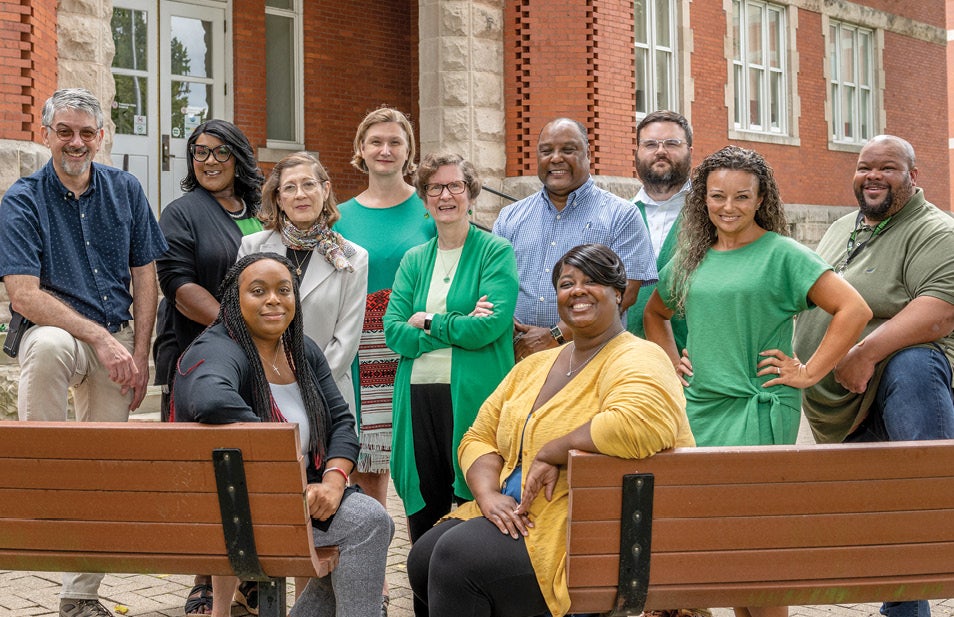Marshall begins a three-year quality initiative to make both the university and the community more inclusive.
 Marshall University has launched a sweeping three-year effort aimed at making it a stronger and more inclusive community. As part of the accreditation requirements set by the Higher Learning Commission, each institution is required to select and implement a large-scale Quality Initiative.
Marshall University has launched a sweeping three-year effort aimed at making it a stronger and more inclusive community. As part of the accreditation requirements set by the Higher Learning Commission, each institution is required to select and implement a large-scale Quality Initiative.
“We have chosen to focus on building a stronger and more inclusive community because we feel that when people from diverse backgrounds study and work together, we enrich our own learning,” said Dr. Mary Beth Reynolds, associate provost and associate vice president for assessment and quality initiatives. “Together we make our communities better places to live and work.”
Reynolds was quick to point out that there were a large number of faculty involved in planning the three-year initiative. Just some of those individuals include Dr. Feon Smith-Branch, associate professor and program coordinator of Adult and Continuing Education in the College of Education and Professional Development; Bruce Felder, chief talent and diversity, equity and inclusion officer; Dr. April Fugett, interim executive director of the Center for Teaching and Learning; Dr. Andy Hermansdorfer, director of student involvement and leadership; Brandi Jacobs-Jones, senior vice president of operations; Dr. Montserrat Miller, executive director of the John Deaver Drinko Academy; and Dr. Kateryna Schray, English professor and the Charles E. Hedrick Outstanding Faculty Award recipient for 2012-2013.
Reynolds said Marshall’s Quality Initiative has three goals: “To increase students’ readiness to work and live in a global and/or otherwise diverse community by providing them opportunities to grow and learn through contact with others who come from cultures, races, or backgrounds different from their own. To increase access to the university by reducing barriers that disproportionately disadvantage people from underserved populations and provide support needed for success. And to promote student learning through outreach to the community.”
During its implementation, Marshall’s Quality Initiative will focus on three themes:
Year 1: Complexities of Identity
Year 2: Building Bridges
Year 3: Embracing and Celebrating Differences
Projects supporting the first goal include theme-aligned readings. For example, one book will be selected each semester for campus-wide reading, with suggested scholarly readings for classroom use. In addition, there will be theme-aligned lectures, discussions and activities; diversity dinner groups that bring together new freshmen from different backgrounds several times each fall; and an inaugural diversity learning community.
“Members of student organizations are being challenged to select another organization with whom, under normal circumstances, they might not be likely to collaborate.,” Reynolds explained. “There can be many reasons for possible lack of natural collaboration, and students will be asked to consider these reasons. Is it because the members of the other organization differ from them in background, political or religious ideologies, general outlook on life? Our hope is that, through working with and getting to know people who are different from ourselves, we expand our appreciation for differences and realize we have many similarities.”
The book selected for campus-wide reading for this year’s first semester is Dr. Cicero Fain’s Black Huntington: An Appalachian Story. A Huntington native, Fain is a visiting diversity scholar in Marshall’s History Department.
“There is no greater pleasure and point of pride than knowing that your work matters,” Fain said. “My book illuminates, acknowledges and celebrates the sacrifices, labors and successes of Black pioneers who contributed mightily to the rise of Huntington as a regional industrial, commercial and sociocultural center. This unique history continues to animate the efforts of area residents dedicated to elevating it to a place of prominence and relevance. In truth, one cannot truly appreciate the story of Huntington and the Tri-State region without knowing the story of its Black heroes and heroines. I am delighted that my book contributes to this goal.”
The book selected for campus-wide reading for the Spring 2023 semester is Another Appalachia: Coming Up Queer and Indian in Mountain Places, by Neema Avashia.
Reynolds said projects supporting the Quality Initiative’s second goal include the enhanced recruiting and retention of students, faculty and staff from chronically underserved populations, and an outside evaluation of university policies to ensure they adhere to the principles of equity.
Projects supporting the initiative’s third goal include engaging Marshall students as near-peer mentors for Health Science & Technology Academy (HSTA) clubs at area high schools and providing an opportunity for a Marshall student to work as an intern with the Fairfield Community Development Corporation.
“We will measure outcomes of the Quality Initiative through annual surveys, pre/post evaluations, input from project participants and institutional data trends,” Reynolds said.
Four to 12 incoming freshmen will be selected to participate in a Diversity Learning Community each year. They will receive scholarships and, with the support of their faculty mentor, engage in diversity programming and leadership opportunities throughout the year.
Reynolds said the initiative, which is focused on diversity, is not just important for students and staff, but also for people in the surrounding community.
“When we work and socialize with people who come from backgrounds different from our own, all our lives are enriched by the new experiences we share and the new things we learn,” Reynolds said. “When we can talk with people who have different ideas or viewpoints than we do, we learn to critically examine our own ideas. In a diverse society, we quickly learn that no person can be defined by only one characteristic.”
———
About the Author: James E. Casto is the retired associate editor of The Herald-Dispatch and the author of a number of books on local and regional history.
Photo: A large number of faculty and staff have been and continue to be involved in planning the three-year Quality Initiative that aims at making a stronger and more inclusive community.